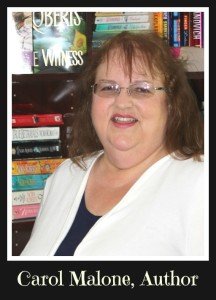Writers, Balancing Act: Learning vs. Doing, by Carol Malone
 Please welcome author and editor Carol Malone. Today she’s sharing her article on learning vs. doing as it concerns us as writers. Enjoy!
Please welcome author and editor Carol Malone. Today she’s sharing her article on learning vs. doing as it concerns us as writers. Enjoy!
***
I’ve been stuck in my writing of late and I started wondering about my goals. Though I want to be a bestselling author and made every plan and goal in my mind to do so, something is holding me back. Maybe my goal isn’t big enough. Or maybe, something in my thinking went haywire and I started believing that I needed to read or study every word on the subject of writing before I could write another word.
Do you know a writer like this or are you one yourself? If given the choice, will you study about writing endlessly? Do you listen to the experts or attend conferences? Do you check out all the bestselling novels or literary fiction or poetry compilations for examples of fine writing from the library? Do you rub elbows with the various folks in your writing/critique groups hoping their excellence will rub off? Even after all that, are you like me and don’t actually do a lot of writing?
According to one of my favorite inspirational writing gurus, David Farland, best-selling author of The Runelords, and the man responsible for getting his publisher to read the very lengthy Harry Potter manuscript, “Some of them [writers] have been studying for years but have never completed a novel, a short story, or even a poem. Are they really writers? Are they getting ahead? That’s debatable. They might be able to speak on panels at conventions loquaciously, but they’re not proving that they understand the process by doing it.” http://mystorydoctor.com/a-question-of-balance/
The converse is just as bad. I’m sure you know writers who write, write, write, but they refuse to learn new things – refuse to be corrected, critiqued, or edited. They can’t imagine there might be a better way out there to put words to paper. They insist that “practice makes perfect” and end up with substandard writing because they won’t be an old dog that learns new tricks and that trick is, “Perfect practice makes perfect.”
When I first started writing, I just wanted to write – as fast as I could and as many manuscripts as I could. Terrible writing. I didn’t care. My goal was to write and I wrote – goal accomplished. I wrote six manuscripts in the first three months of my career. Would I want you to read them? Heck no.
Then, I thought I would be a better writer by doing everything BUT writing. I joined the RWA and a host of other groups. Went to conferences. Studied with industry leaders, college professors, literary agents. Worked with book coaches and book editors. Subscribed to magazines like Writer’s Digest. Purchased multiple expert books on writing. Took tons of online workshop/webinar courses.
But … I stopped writing my fiction consistently. I was filled with fear that I wasn’t learning enough, and that my writing wouldn’t measure up.
I also didn’t make writing a priority in my everyday schedule. Even now I have the same attitude as the hare did in the hare-and-the-tortoise-race-story. I write thousands of words one day, then none for weeks at a time. Starting. Stopping. Starting. Screeching to a stop, and starting again. I’m still too busy believing I need to know everything there is about the art of writing instead of writing!
So what’s the answer to my dilemma? Do I take more online writing webinars, attend another writer’s conference? Or write lots more non-fiction, educational-type writing?
Quick answer: Yes and no! – to all of that. Everything within reason.
Balancing Act
So … what’s a good balance? How can I feel like I’m continuing to learn and yet put my writerly education to work and augment my writing with living?
I’ve combined ideas from a few sources and put together a list of possible ways to balance my writing life and my real life. You’re free to make up your own priority list, but, as Nike says, “Just do it!”
Here’s my list:
- Get up early: How early is up to you. I’ve heard of some writers who get up at 3am. Yikes!
- Express gratitude: Saying thanks for what you have and for being able to get up early.
- Set a date and time with yourself to do nothing but write: Some people suggest you write every day. I’m readjusting my thoughts on that, and I’ll express that next month in my October column.
- Exercise: It doesn’t matter what, just move your body. I read somewhere (can’t find the reference now) that just thinking about going to the gym will spark your creativity. But don’t just think about it – go. Do. Something.
- Do something spiritual: Rebooting the spiritual part of your nature will work wonders for your writing and your life. Whether you read the Good Book, pray, meditate, do Yoga, Tai Chi, or stare at the wall, do something to commune with a higher power.
- Eat healthy: Something green can make you a writing machine. (I know, I’m not a poet.)
- Put a smile on someone else’s face by expressing gratitude for them: Send someone a note or call them. Visit a neighbor, a sick friend, or a long-lost relative. Forgive others – even if they were in the wrong. It’ll make you feel better.
- Find a clean, well-lit place to create: Someplace where you can feel comfortable. Could be a home office that you de-clutter, or a restaurant, or coffee bar with an ocean view. Someplace where you can feel free to be you, and invite your muse. We’re Pavlovian creatures. Doing the same thing at the same time at the same place will spark our body’s response to the same sensual and spatial prompts to start writing.
- Tell others you’re a writer: Simply state it to friends and family, then you’ll start to believe it and act like it.
- Learn something new: Now that you’ve got those zillions of writing books, crack one open. Look for a topic to study. Set a timer. Go. Read until the timer buzzes, then STOP! Time to write.
- Switch off all electronic communication devices: Email, iPhones, tablets, social media sites, TV, radio (unless music helps you relax or stimulates the writing Muse), even the phone. Anything that makes a blip or beep will divert your brain. Switch them off.
- Set a quota: If you like, you can set a timer for your writing time. Some people work better under a deadline. I know I do. I love doing writing sprints for 10, 15, or 20 minutes. You’d be surprised how much you can write in that amount of time. Or, set a daily word count. 500, 1,000, or 5,000 words. Only you can decide what you are comfortable with.
- Keep a sense of humor: You’ll need one. Try to find a way to laugh at yourself because your inner critic, and I know you all have one, will try to hammer away at your insecurities regarding your writing and tell you neither you nor your story is relevant. Tell him/her to take a hike!
- Be curious: Stop the what ifs by focusing on the why not. (Tweet this! You can edit before you publish.) Come to your writing with a sense of curiosity and how it’s going to evolve today and what impact it will have on the world. We all want to change peoples’ lives for the better, right?
- Allow yourself to write badly: At least the early drafts. Put on your propeller beanie and just write whatever comes into your head. This is not the time to put on the Inspector Sherlock Holmes’ hat and go at your writing as an editor. You’ll get enough critiques after you finish writing your story. But there won’t be anything to critique if you DON’T WRITE IT!
- Then offer Praise! And Alleluia! At the end of the writing time: You’ve done it. You sat down, you’re learned something, you’ve written some words (they may be junk), but you’ve accomplished something. Mark your progress on a calendar. Record your completed word count. I use an Excel spreadsheet and online, I use Toggl timer. It’s a visual pat-on-the-back to see what I have accomplished.
- Get support if you need it: Be accountable to a friend or spouse. Hire a writing coach. (Best thing I ever did: Beth Barany, http://www.bethbarany.com/). {Editor’s Note: Thanks for the shout out, Carol!} Getting expertise from books is one thing, but having someone to bounce ideas off, is of such greater worth, especially if they are nit-picky and don’t let you off the hook.
- Most important: Have fun! Writing should be a creative expression of what lives in our hearts, in our brains, and in our deepest desires or passions. If you’re not having fun, it’s time to rethink the process or your projects. Try a different genre. If you’re a memoir writer, take a stab at writing a science fiction love story set in medieval France. Explore your possibilities.
- At the end of the day: Give thanks for a job well done. Returning thanks will create in you a gracious, gratitude-filled heart, and will open up your mind to new possibilities.
- Remember to be relentless: Like me, sometime in your writing journey, you’re going to get stuck. Feel writer’s block. Blocked or stuckness is only a product of fear – fear to shove forward with the same grit and determination we needed to get started. If you don’t like my list, make you own and run through it every day, especially if you get stuck.
I would hope, like you, to have a gentle balance – enough writing education so that I can write on to perfection balanced with actual writing. I would hope that we will do as David Farland suggests:
“Do what you need to do, whether you need to study more, practice more, or both, Then, do it again tomorrow.”
References for my list
Debbie Reber’s blog: http://www.debbiereberwritingcoach.com/11-secrets-to-completing-any-writing-project/
Writer’s Digest: Courtney Carpenter, May 7, 2012; http://www.writersdigest.com/tip-of-the-day/make-time-to-write-10-tips-for-daily-writing
Lisa Kent on her blog, Lisa’s Life: http://lisas-life.com/2015/01/05/creating-day-worth-living.html
***
About the author:
 An award winning novelist, Carol Malone writes romantic suspense, rocketing readers into the past to uncover a hard-fought happily-ever-after. Based in coastal California, when not hammering out new tales, Carol reads, watches sports, the Food Network or HGTV, or spends time with her author husband. She loves to connect with her readers on her website, Twitter, and on Facebook.
An award winning novelist, Carol Malone writes romantic suspense, rocketing readers into the past to uncover a hard-fought happily-ever-after. Based in coastal California, when not hammering out new tales, Carol reads, watches sports, the Food Network or HGTV, or spends time with her author husband. She loves to connect with her readers on her website, Twitter, and on Facebook.
Check out her books here:
Fight Card Romance: Ladies Night
Fight Card Romance: Ladies Night Christmas






Great advice!
Ahhh, so much truth! I go through the same spurts of writing a million words and then writing nothing. Yes, really, a million words. (No, not really.)
I also find myself studying more than I should because I don’t want to spend time working on my novel only to find out that it isn’t following a precious fiction rule.
Really great article!
Thank you, Kathy. It was fun to combine a number of thoughts into one long list. I pick and choose one any given day and work on the others one at a time. I can’t do it all and neither should be expect ourselves to do it all right now. Line-upon-line, precept-upon-precept until we master one, then we move on to the next.
Thank you. It was a fun article to write. I completely understand, Sarah about spurts. I’m a spurt writer when I wish to be a consistent writer. It’s a matter of priorities. We must decide what’s most important and what feels emotionally charged within our souls, then go for it. None of us can do it all. My steps were just guidelines – much like the Pirate code.